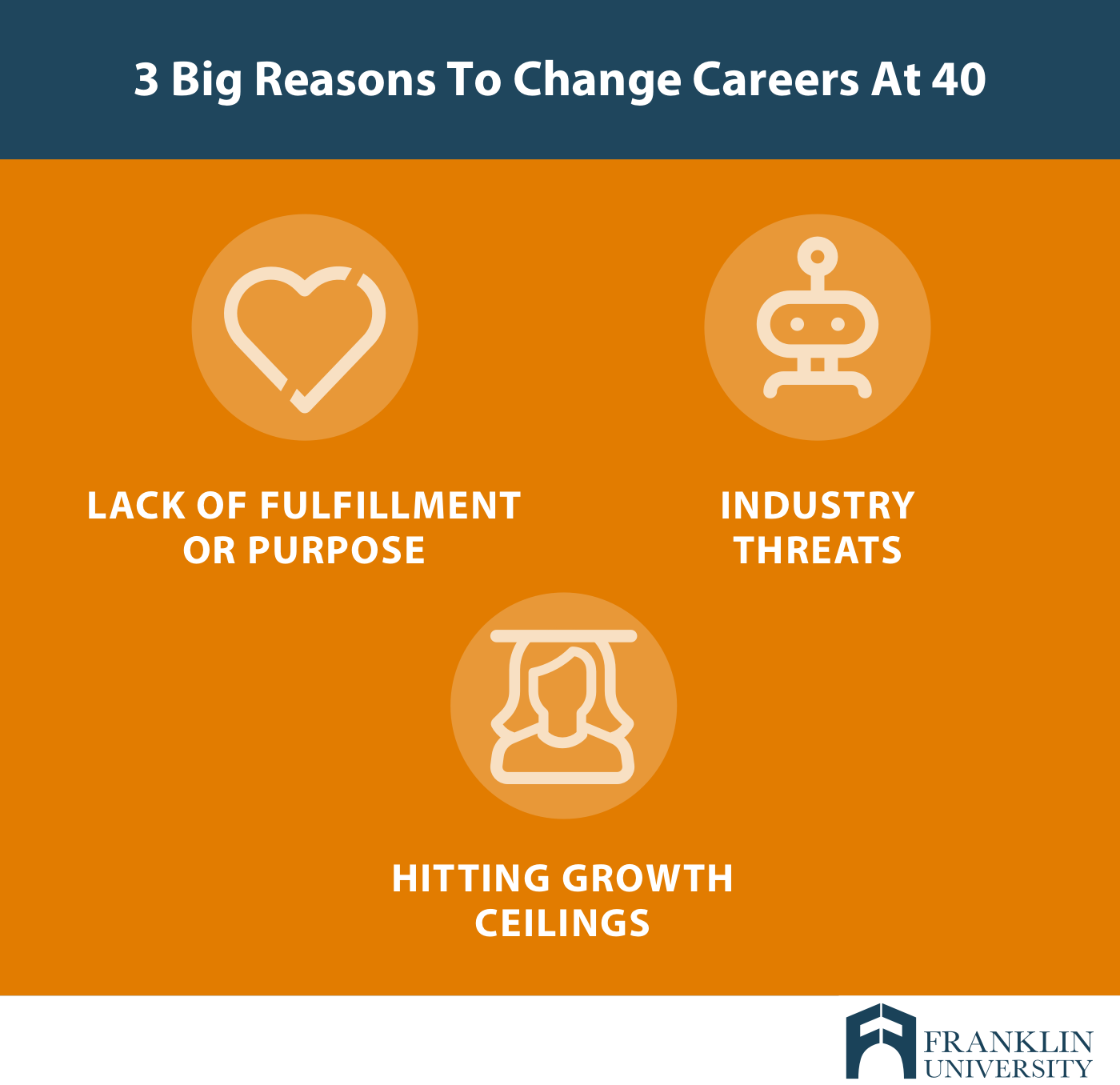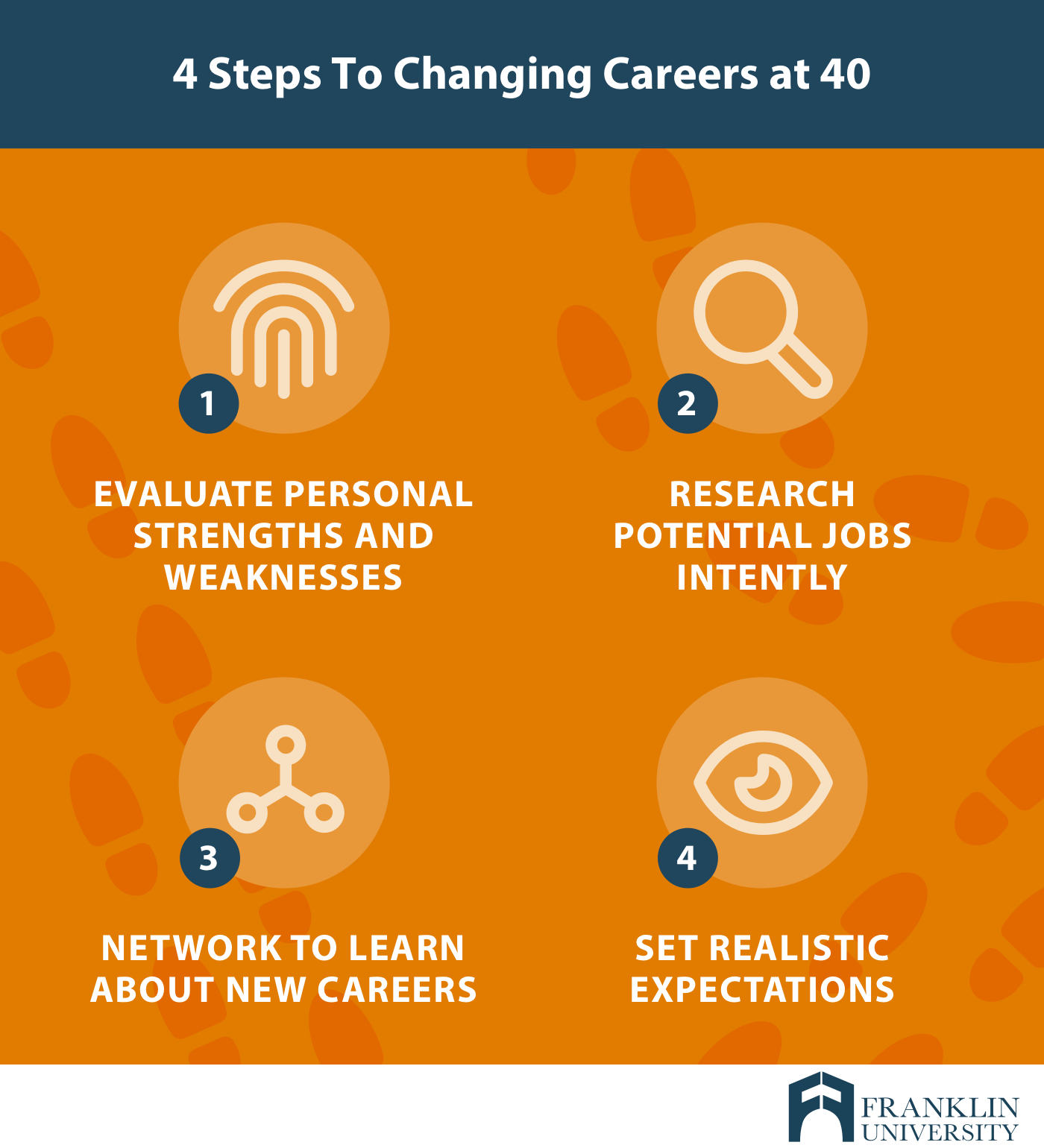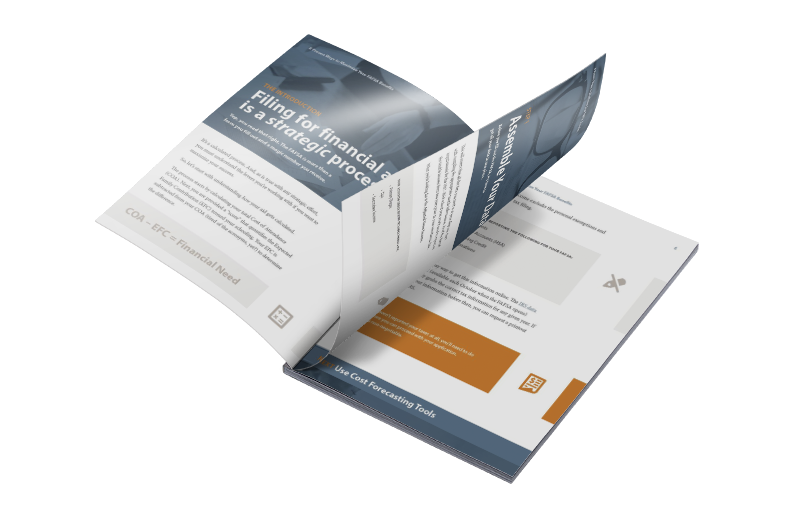Request Information
We're Sorry
There was an unexpected error with the form (your web browser was unable to retrieve some required data from our servers). This kind of error may occur if you have temporarily lost your internet connection. If you're able to verify that your internet connection is stable and the error persists, the Franklin University Help Desk is available to assist you at helpdesk@franklin.edu, 614.947.6682 (local), or 1.866.435.7006 (toll free).
Just a moment while we process your submission.

40 Isn’t Too Old To Change Careers. Here’s How To Do It.
Changing careers at 40 isn’t always easy, but it’s become extremely common. According to the Bureau of Labor Statistics, the average person changes careers seven or eight times during their lifetime.
With time, dedication and hard work, you’re never too old to change careers. If you’re considering taking the leap, consider this your guide to getting started.
Why change careers at 40? While people have different reasons, we've found a few common drivers.
Top Three Reasons People Switch Careers at 40

#1: Lack of fulfillment in current career.
For many people, fulfillment is a major factor in their desire to change careers. A lack of satisfaction at work often leads to increased anxiety, stress, and unhappiness—all of which can be a strain on personal relationships and health.
Why people grow unsatisfied with their career:
- Your day-to-day work isn’t exciting or focused in an area you’re interested in
- You chose your career based on outside influences or salary
- You’re looking for your job to have more meaning and impact in society
#2: Hitting a growth ceiling.
There are many reasons a person’s career can become stagnant. And for many people, the idea of continuing in the same job function for the foreseeable future can be a motivator for changing careers or roles.
These are some of the reasons you may be considering a change:
- There aren’t opportunities for growth in your organization
- Promotions require additional education
- Senior positions require work that you're aren't passionate about
For many mid-career professionals, the answer to these setbacks is advancing their education. Whether it’s getting your bachelor degree, earning a second bachelor’s in a new field or graduating from a master’s program, a new degree can open doors to new careers and advancement opportunities.
#3: Shrinking or changing industries threaten job stability.
Today, it’s common for workforces to experience shifts, especially if a position is impacted by the following circumstances:
- Your role has been adversely impacted by changing technology
- There is a lack of workforce demand for your role or for advancement in your industry
- Your industry is highly impacted by economic fluctuations
To increase job prospects and security, many professionals choose to pursue additional education to keep their skills relevant, or to pivot to a new career or industry entirely.
Four Challenges to Changing Careers at 40
You may be strongly motivated to change your career, but depending on your role, industry and skill set, it may not be easy. Be prepared to face the common challenges that come with career change.
- Establishing personal marketability in a new field. It’s common for mid-career professionals to worry about their ability to compete in the job market. You will need to not only gain the skills to do the job, but also possess the ability to sell yourself to others.
- Overcoming skills and knowledge gap for a new profession. You may be looking to completely overhaul your career, get a new position in your current field or seek a promotion. But to do these things, you’ll need to gain new skills and knowledge that make you stand out as a job candidate.
- Balancing school work with a current job and responsibilities. The majority of people don’t have the luxury of quitting their current job to pursue a new one. That means you have to hustle on the side—whether that’s earning your degree, gaining new skills or networking—after hours and on the weekend.
- Defeating the anxiety about what’s ahead. Overcoming the fear and anxiety of changing careers can be difficult. What if you have to step a step back or make a lateral move? How will changes in profession impact your personal life? You need to be prepared to answer questions like these so you can face your worries head on.
Heading back to school? Make sure you max out your Financial Aid with the help of this free FAFSA report.
Four Steps to Changing Careers at 40
After deep consideration and reflection, maybe you’re ready to make the jump. We want to make sure you’re setting yourself up for success as you transition into a new job. Here are our top recommendations to prepare yourself to change careers at 40.

Step 1: Evaluate personal strengths and skills
You can approach this by taking a career assessment, researching how to turn your passion into a job and making a list of your transferable skills and knowledge, as well as any skills gaps you may have.
Step 2: Research potential jobs
If you have an idea of what field you want to go into or a role that interests you, be sure to do your research into the different jobs that fall into that category. Take note of the specific job responsibilities to make sure you understand what you will do in that role and the skills it requires.
Step 3: Network effectively
Find ways to make connections with other professionals in your desired career or industry. Take every advantage of personal and professional opportunities to gain insight into the job and make connections with people who may be able to refer you in the future.
Step 4: Set realistic expectations
Make sure you take into account the practical realities of changing your career. You need to understand how it will impact your family, your salary expectations and job prospects. And remember, all job growth doesn’t have to be vertical, but plan for the impacts of these changes.
High-Growth Careers Fields for Professionals Looking to Make a Change at 40
As you look to change careers in your 40s, identifying high-growth industries with job stability, advancement opportunities and high earning potential can set you on a new, rewarding career path.
Pursuing advanced, applied degrees in these fields in usually the first step to a career transition. Explore these industries and opportunities, as well as correlating degree programs that can give you a leg up as you change careers.
Healthcare
As the baby boomer generation ages, the need for healthcare professionals at all levels is rapidly increasing. This demand provides a stable and well-paying career, while also offering the ability to improve the lives of others.
- Health Informatics: Reliable data is crucial to the success of any healthcare organization. You’ll use your skills in data analysis to improve decision making and efficiency, ultimately leading to a higher quality of patient care.
- Healthcare Administration:Help healthcare systems adapt to change and run more efficiently, while maintaining a high quality of care.
Technology
No matter what industry you’re in or are looking to join, technology is making a huge impact on how business is done. And it isn’t just tech firms that are growing, traditional industries and businesses are continuing to adapt their business models and processes, making this a stable and lucrative career path.
- Cybersecurity: As technology grows and becomes more distributed, keeping data safe is more important, and more difficult, than ever before. Help businesses guard against security threats and provide critical support to securing data.
- Information Technology: Organizations need individuals who have the skills to manage the networks, systems and databases their businesses are built on.
- Information Systems: Help organizations leverage data to make more strategic business decisions and drive growth.
Business
Business professions can be found across every industry. These core job functions keep companies running smoothly and offer a constant variety of challenges and opportunities.
- Risk Management: The insurance industry continues to grow and both insurers and companies need individuals to help them mitigate risk, manage loss and reduce liability.
- Human Resources: Use organizational leadership and people skills to help create a positive corporate culture and support others in their professional growth.
- Marketing: Use your skills of persuasion and effective communication to help companies reach consumers and boost sales.
Choose A Program That’s Right for You as You Change Careers
If you’re a mid-career professional who wants to change or advance their career, you need support and guidance as you navigate this new chapter of your life.
At Franklin University, we design our degree programs for the specific needs of working professionals. We offer flexible, online coursework that’s grounded in applied knowledge and developing real-world skills. We also give you the tools and resources to make a successful career change—no matter your age.
If you’re interesting in pursuing a new degree as your first step toward a new career, explore our bachelor’s degree programs and master’s degree programs.





